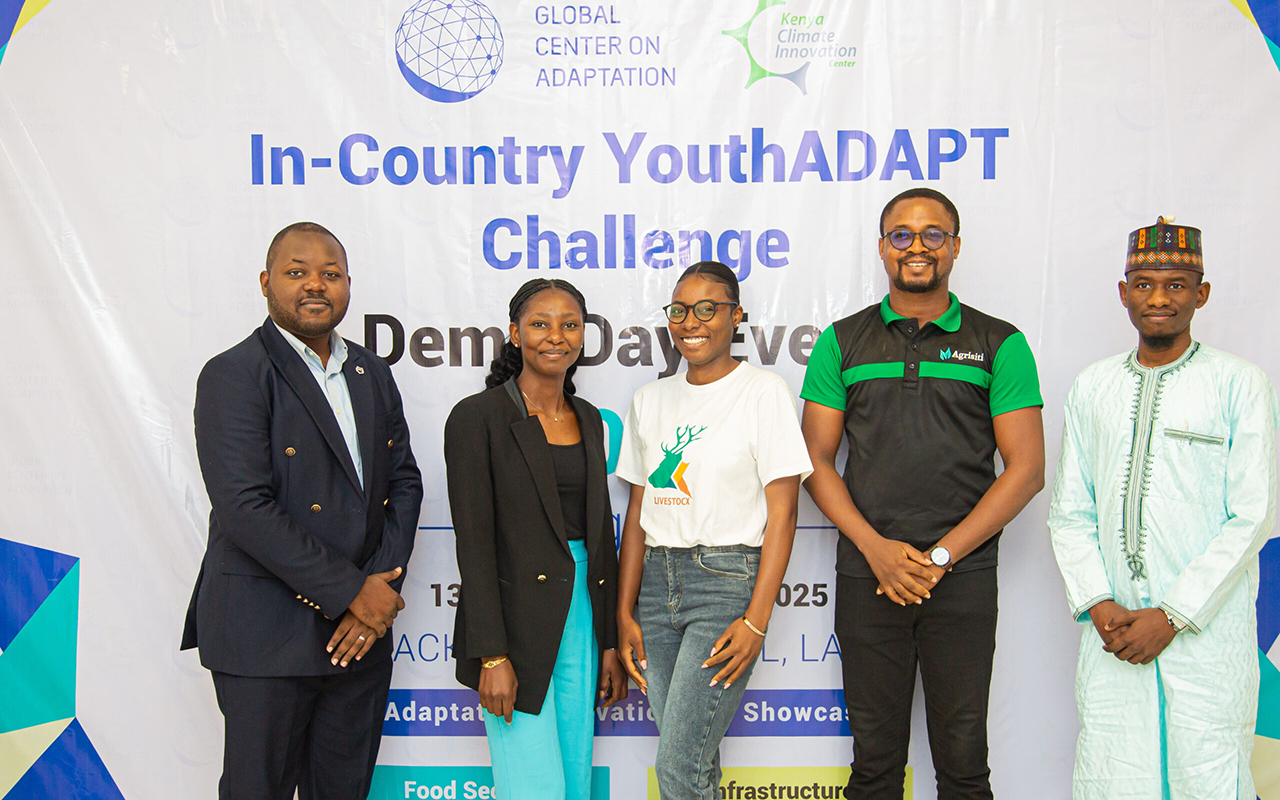Two young African innovators developing cutting-edge climate adaptation solutions have emerged as winners of the YouthADAPT Challenge 2025, receiving $60,000 and $30,000, respectively, to scale ideas that drive resilience across key sectors such as food security and infrastructure.
The challenge seeks to boost sustainable job creation through support for entrepreneurship and youth-led innovation in climate change adaptation and resilience across Africa. The competition invites young entrepreneurs and Micro, Small, and Medium-sized Enterprises in Africa to submit innovative solutions and business ideas that can drive climate change adaptation and resilience.
Promoted by the Global Centre on Adaptation (GCA), Kenya Climate Innovation Centre (KCIC) and Nigeria Climate Innovation Centre (NCIC), the challenge seeks to close the funding gap for youth-led initiatives tackling the climate crisis across Africa.
The two-day YouthADAPT 2025 Demo Day (Nigeria) held in Lagos featured 15 pitching sessions, delivered in a hybrid format, with each participant receiving $1,000. A five-member panel of industry experts evaluated the technical strength, market viability, and impact potential of the innovations.
President and Chief Executive Officer of GCA, Prof. Patrick Verkooijen, said African youth are not only victims of the climate crisis but also “architects of the solutions.”
“This programme offers practical climate leadership by creating jobs, strengthening food systems, and aligning innovation with national climate priorities,” he said.
Verkooijen explained that the event was designed to connect youth-led adaptation enterprises with local and regional investors, providing them with a curated pipeline of high-potential businesses supported by structured due diligence.
“We are bridging the financing gap by giving investors access to promising adaptation businesses. I call on banks, development finance institutions, impact investors, and corporate partners to join this initiative,” he added.
Chief Executive Officer of KCIC, Joseph Murabula, described Africa’s youthful population as its greatest resource, noting that the initiative moves beyond rhetoric to tangible action.
“Through the In-Country YouthADAPT 2025 Challenge, we are equipping young Africans with funding, mentorship, and market access to transform their climate adaptation ideas into viable businesses,” he said.
Murabula added that the initiative aims to build climate resilience from the ground up, focusing on strengthening food security and infrastructure. “Final selections and investment commitments will be announced at COP30 in Brazil in November 2025, where the top ten youth-led enterprises will be showcased globally,” he revealed.
Special Adviser to the Lagos State Governor on Climate Change and Circular Economy, Mrs Titilayo Oshodi, noted that climate change offers an opportunity to harness adaptable and innovative solutions from young people.
“Platforms like YouthADAPT provide a long-term view of the skills and ideas needed for a sustainable environment and livelihood in Lagos and Nigeria,” she said.
Oshodi highlighted the effects of climate change on displacement, food insecurity, and public health, urging increased climate literacy to help youth design actionable and context-specific interventions.
“We must be deliberate about monitoring, measuring, and capturing data to guide the creation of local, replenishable, and sustainable solutions,” she added.
Team Leader at KCIC, Prabhakar Vanan, told The Guardian that the In-Country YouthADAPT programme evaluates whether youth innovations can effectively address national challenges in food security and infrastructure.
“These innovators need technical assistance, mentorship, incubation, and a financial ecosystem that moves away from traditional funding models toward creative, flexible approaches. This support is critical for scaling solutions locally and exporting them across Africa,” he said.
President of the Organisation for Technology Advancement of Cold Chain in West Africa (OTACCWA), Mr Alexander Isong, who served as one of the judges, said the panel not only assessed the participants but also guided them in refining their business models.
“We helped the entrepreneurs turn their ideas into profitable and scalable ventures that can create impact and jobs,” he said.






